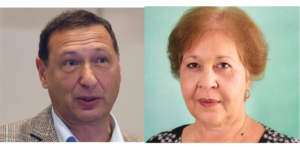
Boris Kagarlitsky and Alina Barbara López Hernández
Understanding is not condoning. One can understand the logic behind authoritarian behavior, without endorsing the pretexts it often uses to punish its victims. Understanding is important to anticipate the actions of the repressors, dismantle their lies, and generate solidarity with the persecuted.
As I write (and you read) these lines, two intellectuals, two friends, are persecuted by the respective governments of their countries. Alina Barbara López Hernández in Cuba, and Boris Kagarlitsky in Rusia.[i] Both face spurious criminal proceedings, deployed against them in a punitive environment where the basic guarantees provided by Cuban, Russian and international legality have been violated. Alina awaits her hearing in freedom, Boris has been imprisoned.[ii] The two continue, in their situations to confront the power that threatens them. And also their accomplices.[iii]
Both have revealed the ideological and political incoherence of power. The lie become the state’s (un) reason. Because Alina is a socialist intellectual persecuted by a government that declares itself socialist while carrying out a brutal economic reorganization on the backs of its workers. While, Boris is an anti-fascist punished by a regime that presents its invasion of a neighboring country as anti-fascist.
Both belie the fatalisms instilled in power. They come from generations formed under the propaganda and education forged by the Mass-Man; but they have become citizens and behave as such. They have avoided confusing their rejection of Stalinism with the denunciation of the entire left tradition. Both decided to continue thinking, educating, resisting… In the same land ungoverned by its repressors.
Their stories contrast with those of courtly intellectuals who, in Havana or Moscow, have chosen to shut up, flatter or ramble while their nations are crushed by selfish, exploitative, cynical, abusive governments. The mere existence of Alina and Boris (and the thousands of Alinas and Boris who learn, right now, that another way of being is possible), is a cause of gossip and badmouthing by those who have chosen to put their knowledge at the service of oppressive powers.
Both make us remember the reasons why silence, in cases like this, sooner or later reaches us all; why it makes as little sense to push anyone to sacrifice – Alina and Boris have never demanded that others immolate themselves for them – as to remain impassive before the dignified position they hold. If Cuba and Russia are ever again worthy of a full and happy life, it will be due to the Alinas and Boris who still resist.
That’s why we can’t leave them alone.[iv] There are many ways to be supportive of your “cases.” Taking their messages to the international press; supporting their causes on the WEB (right now putting a like is a sign of civic courage in Russia and Cuba), or accompanying them in court. Giving all the necessary support to their loved ones, leaving the greatest possible warning to their repressors. Everyone does what, according to choice and circumstances, they can, but paralysis is not an option.
Hanna Arendt once wrote: “Nobility, dignity, perseverance and a certain laughing courage. Everything that constitutes greatness remains essentially the same through the centuries.” It is just that, a struggle for one’s own dignity and that of others, embodied in the fragile matter of two human beings, of two people like us, that is at stake now. You decide.
Notes:
[i] (https://es.wikipedia.org/wiki/Borís_Kagarlitski)
[ii] https://www.counterpunch.org/2023/08/17/letter-from-prison/
[iii] https://www.nuso.org/articulo/Rusia-Putin-guerra-Ucrania/
[iv] https://nuso.org/articulo/Kagarlitski-Rusia-guerra/


Leave a Reply